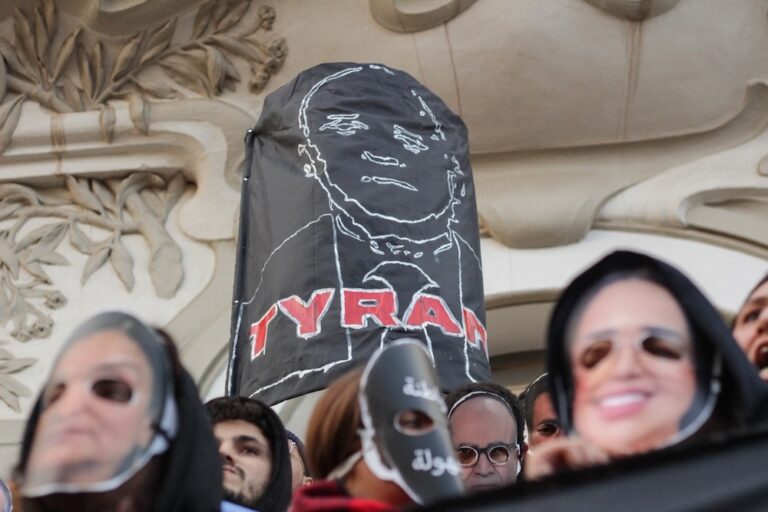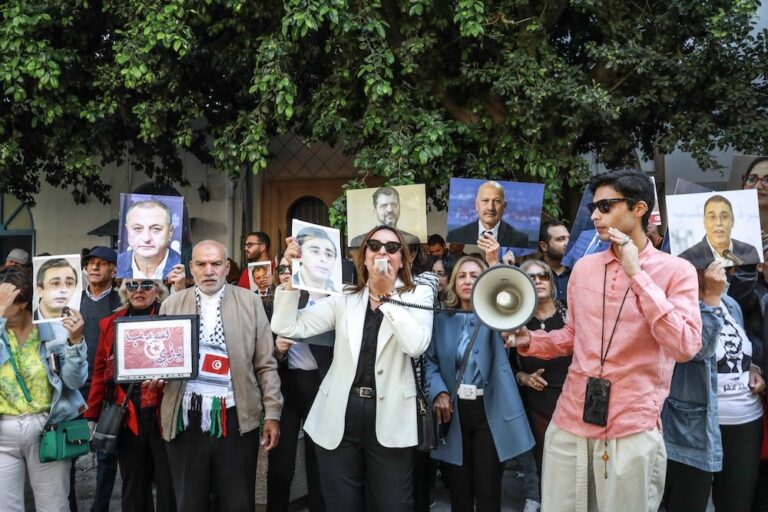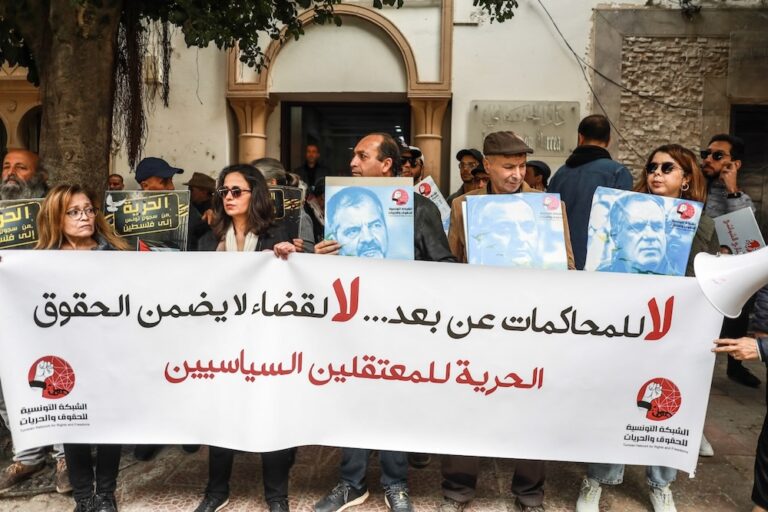(RSF/IFEX) – The following is an 18 October 1999 RSF press release: **For background on the Taoufik Ben Brick case, see IFEX alerts of 8 October, 30 September, 12 July, 27, 25, 20 and 14 May, 28 April, 29 and 13 January 1999 and 24 June 1998** Presidential election campaign in Tunisia: Media serve the […]
(RSF/IFEX) – The following is an 18 October 1999 RSF press release:
**For background on the Taoufik Ben Brick case, see IFEX alerts of 8
October, 30 September, 12 July, 27, 25, 20 and 14 May, 28 April, 29 and 13
January 1999 and 24 June 1998**
Presidential election campaign in Tunisia:
Media serve the purposes of candidate Ben Ali almost exclusively
On the occasion of the presidential and legislative elections slated for 24
October, Reporters sans frontières is denouncing the systematic attacks on
press freedom in Tunisia and asks the candidates to commit themselves to
making sure that freedom of expression is finally respected. Due to the
absence of an independent press, the election campaign is more a
“masquerade” than a true democratic competition.
Censorship is a fundamental component of the police state put in place by
Mr. Ben Ali. All information which is open to interpretation as critical of
the regime is banned, even in sectors which seem distant from the stakes of
power (environment, cultural heritage, etc.). Before being published,
politically sensitive articles are first sent to the Ministry of the
Interior. Media are under political control and publish many articles which
heap praise on the president and the government’s policies. Only information
which is circulated by the palace can be published. Without exception, all
the dailies publish a photograph of President Ben Ali on their front page
every day.
The majority of the coverage on the electoral campaign by the media is
favorable to the outgoing president, whose actions and goings on are
pervasive in newspapers. The two other candidates of the “legal opposition”,
Abderrahmane Tlili, who heads the Unionist Democratic Union (l’Union
démocratique unioniste), and Mohamed Belhadj Amor, leader of the Popular
Unity Party (Parti de l’unité populaire), must satisfy themselves with no
more than symbolic media coverage. Their campaigns, covered by the press in
an avaricious fashion, serve more as “democratic guarantees” than true
sources of democratic debate. As for radio and television stations, which
are state monopolies, they have only broadcast information concerning
opposition candidates once.
Currently, two Islamist journalists remain imprisoned: Hamadi Jebali,
director of the weekly Al Fajr, official organ of the Islamist movement
Ennahda, was sentenced by the Tunis Military Court to a sixteen-year prison
term for “attacks with a view towards changing the nature of the state” and
“membership in an illegal organisation”. He had just completed serving a
one-year prison term after being sentenced, on 31 January 1991, for having
published an article critical of the military court system, which is used by
authorities to suppress Islamists. Abdellah Zouari, also a contributor to Al
Fajr, was arrested on 12 April 1991 and sentenced to an eleven-year prison
term for “membership in an illegal organisation”. The two journalists were
tried on 28 August 1992 with 277 members of the Ennahda movement, for an
“Islamist conspiracy”. International standards of due process were not
respected during the trial (unclear accusations, torture, arbitrary
detention, limited access to lawyers, etc.). Since their sentencing, Hamadi
Jebali and Abdellah Zouari have been jailed in difficult conditions:
overpopulated cells, difficulties to acquire medecine, obstacles blocking
family visits, pressure on the lawyers.
At the same time, independent journalists are the targets of real
harassment: police surveillance, telephone tapping, residence searches,
administrative problems, the cutting of telephone and fax lines, refusals of
accreditation, dimissal of their spouses and friends, passport
confiscations, demands for payment of back taxes, etc. The most recent
example: on a number of occasions throughout 1999, Taoufik Ben Brick, Tunis
correspondent of the French press agency SYFIA and of the French daily La
Croix, has been harassed by authorities. His telephone line was cut, his
mail was confiscated, he has been under constant police surveillance (two
cars follow him and park in front of his residence), his car has been
vandalised, he has been ordered before the Ministry of the
Interior, and his passport has been confiscated. The journalist was first
arrested in June 1998 for writing an article published in La Croix on the
police methods used by the authorities. The authorities accuse the
journalist (through a press release of the official press agency, ATCE) of
“marketing a ‘pseudo-delirious’ tale of persecution which makes him spread
all manner of ramblings and fabrications”. On 20 May, the journalist was
again attacked in the street by men who allegedly struck him and who the
journalist identified as plainclothes police officers. This attack was
denounced by the spokesperson for the French Ministry of External Affairs.
On 24 May, the journalist was arrested by police officers who arrived
without an arrest warrant, after searching his residence. He was released
after being questioned for three hours.
The foreign press must also submit to strict controls and all publications
which criticise the regime are banned in the country. Four issues of the
French daily Le Monde and seven issues of Libération which included articles
concerning human rights in Tunisia were censored between January and June
1999. The guidelines concerning censorship of foreign publications are
unknown. The banning orders are never explained by the Ministry of the
Interior. Article 25 of the Press Code stipulates that “the introduction and
distribution of foreign works in Tunisia, be they periodicals or not, may be
banned by decision of the Ministry of the Interior, further to a
recommendation by the Ministry of Information”. Another example: there is a
complete distribution ban on the French daily La Croix throughout the
country. But beyond strict bans, or the odd seizure, there is another
hindrance to the free circulation of information: the systematic delay of
distribution. As such, every day at the airport, the authorities delay the
release of the newspaper Le Monde, causing a delay in the newspaper’s
distribution of 24 hours in the capital and 48 hours in other regions of the
country.
The Press Code of 28 April 1975 violates international treaties signed by
Tunisia which guarantee freedom of expression. The imprecision of Article
49, which describes the crime of “distribution of false news likely to
disturb the public order”, is a permanent threat to the press. In practice,
this crime has been invoked on numerous occasions to suppress journalists.
The penalties for press law infractions were increased in the Press Code
amendment of 1993. Press offences are punished by sentences of up to five
years in prison. Beyond the legislative texts, judicial, administrative and
police practices contribute in hindering the free circulation of
information. An example: the administration has transformed the registration
of copyright, which was a simple filing formality, into a true instrument of
preliminary censorship. Each edition of a newspaper must be registered with
the Ministry of the Interior prior to distribution. The ministry’s refusal
to register an edition constitutes a de facto ban. In addition, a number of
requests to launch new publications have remained unanswered. As such, the
feminist Noura Borsali had submitted her request to launch a feminist
newspaper in 1991. In 1999, she has yet to receive an acknowledgement of
receipt or even an explanation for this de facto censorship.
Recommendations
Reporters sans frontières demands that the candidates in the presidential
election commit themselves to:
– seeing to it that the harassment campaigns against journalists and
pressure on them cease immediately, launch inquiries into the abuses
committed and punish the responsible parties;
– ensuring a fair and impartial trial before civil courts for the two
imprisoned journalists Hamadi Jebali and Abdellah Zouari,
– amending the Press Code, so that press offences are defined more precisely
and that they not be subject to prison sentences,
– re-establishing the freedom to circulate, by returning confiscated
passports to journalists or by issuing new ones to those who request
them,
– lifting the restrictions on the accreditation of foreign correspondents
and local journalists who work for foreign media, ensure free movement in
the country to journalists who request it and allow foreign publications on
the market.


